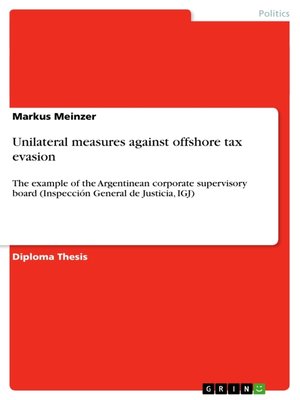Unilateral measures against offshore tax evasion
ebook ∣ The example of the Argentinean corporate supervisory board (Inspección General de Justicia, IGJ)
By Markus Meinzer

Sign up to save your library
With an OverDrive account, you can save your favorite libraries for at-a-glance information about availability. Find out more about OverDrive accounts.
Find this title in Libby, the library reading app by OverDrive.



Search for a digital library with this title
Title found at these libraries:
| Library Name | Distance |
|---|---|
| Loading... |
(...) The present thesis seeks to contribute to substantial answers to this question. Its subject is a set of regulatory measures taken by the Argentinean Corporate Supervisory Board Inspección General de Justicia (IGJ) between 2003 and 2005. One of their alleged aims is to counteract offshore tax evasion through a ban of the aforementioned shell companies, an approach which is deemed to be unique and novel worldwide. The venture of the IGJ rests on the assumption that the bona fide-treatment of the latter's legal person is crucial for cross-border tax evasion. Designed as an explorative case study, the thesis' central interrogative is about the normative-judicial scope and the factual impact of IGJ's policy on offshore tax evasion. Much of the data underlying the answers given henceforth has been collected through a two-months field research in Buenos Aires.
The structure of the thesis is as follows: The second chapter opens with a brief section of definitions of key terms used thereafter (2.1). Section two (2.2) seeks to clarify the practical relevance of the subject and to establish and engross its links to two theoretical debates. Thereby, the central question and two related hypothesis will be carved out (2.3). In the following section (2.4), the subject is circumscribed. Epistemological and broad methodological issues are addressed in section 2.5, sources and formal issues are presented in 2.6. The field research and interview methodology are subject of section 2.7. The third chapter is dealing mostly in a descriptive way with the legal context of the IGJ-norms (3.1), focuses on institutional and general administrative issues in relation to their implementation (3.2), presents the regulations in question chronologically (3.3) and eventually summarizes the mayor issues relevant for the subsequent analysis (3.4). In the fourth chapter, the measures are subject to analysis with regard to a test of the first hypothesis presented in chapter two. The fifth chapter seeks to do the same for the second hypothesis, although the venture is far more complex and the results are more ambiguous. Some points of departure for further research are addressed. In the sixth chapter, an answer to the central question is provided, the results of the test of both hypotheses are summarized, conclusions are drawn and a more generic outlook is given.







